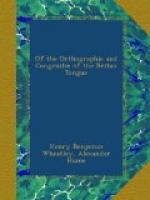The foregoing Tract is one of great interest, not only on account of its intrinsic merit, but also for the racy style of writing adopted by its author. We find him continually garnishing his language with such idiomatic and colloquial expressions as the following:—“Quhae’s sillie braine will reache no farther then the compas of their cap” (page 2); and again, “but will not presume to judge farther then the compasse of my awn cap” (p. 20). He observes of the printers and writers of his age that they care “for noe more arte then may win the pennie” (p. 2), and on the same page he says, “quhiles I stack in this claye,” which appears to be equivalent to our term “stuck in the mud.” At p. 3 he says, “and it wer but a clod;” at p. 14, “neither daer I, with al the oares of reason, row against so strang a tyde;” and again, on p. 18, we find reason under another aspect, thus, “noe man I trow can denye that ever suked the paepes of reason.”
It seems that the expression, Queen’s English, is by no means of modern date, as we have it as the king’s language at p. 2.
Hume laments, in his Dedication, the uncertainty of the orthography prevailing at the time he writes, and yet we find him spelling words several different ways, even within the compass of a single sentence, without being able to lay the blame upon the printers; thus we find him writing ju_d_gement on p. 11, ju_d_ge p. 8, and ju_d_g p. 33, but juge p. 18; and there are numberless other instances that it would be tedious to enumerate. Again, the author uses a mixture of Scotch and English, so we have sometimes ane and sometimes one; nae on page 1 and noe on p. 2; mare and mast, and more and most, even in the same sentence (p. 30); and two is spelt in three different ways, tuae, tuo, and tuoe.
Our author’s stay in England appears to have drawn his attention to the differences between the two languages of Scotland and England, which he distinguishes as North and South. He certainly shows, in some instances, the greater correctness of the Scotch with regard to the spelling of words derived from the Latin; as, retine instead of retain, corage instead of courage, etc. (p. 20), in which words the redundant letters that we Southerners have introduced are thrown out. He is, however, by no means partial, and gives us praise when he thinks we deserve it.
Page 9. The arguments in favour of the sound given by the English Universities to the Latin i are curious: it is stated to have its value in the Greek +ei+; but the author seems to have been in error as to the English sounding mihi and tibi alike, or our pronunciation must have changed since his time.
P. 10. The author speaks of the letter y as being used by the South for the sound now symbolized by i with a final e following the succeeding consonant, as will with an i, and wile with a y in place of the i and final e; thus in the same way he spells write, wryt.
P. 11 (7). He gives food, good, blood,
as examples of the same sound,
thus inferring that the English pronounced
the two latter so as to
rhyme with food.




